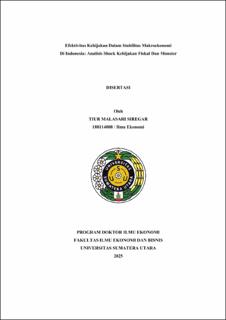Efektivitas Kebijakan dalam Stabilitas Makroekonomi di Indonesia: Analisis Shock Kebijakan Fiskal dan Moneter
Policy Effectiveness in Macroeconomic Stability In Indonesia: An Analysis of Fiscal and Monetary Policy Shocks

Date
2025Author
Siregar, Tiur Malasari
Advisor(s)
Hasyim, Sirojuzilam
Sari, Raina Linda
Ruslan, Dede
Metadata
Show full item recordAbstract
The phenomenon in this study discusses fiscal and monetary policies that have not been able to maintain macroeconomic stability in Indonesia caused by the global economic crisis in 2008 and the COVID pandemic that hit the world. Changes in fiscal and monetary policies are often the result of a combination of various complex and interrelated factors such as when inflation reaches high and uncontrolled levels, the labor market can become inefficient and unstable, which results in a negative impact on economic growth and public welfare. In addition, high and uncontrolled inflation can also lead to an increase in unemployment. The purpose of this study is to analyze the effectiveness, analyze policy shocks, analyze the percentage of contributions, evaluate the effectiveness of fiscal and monetary policies on macroeconomic stability and analyze the level of convergence of macroeconomic stability through government and exchange rate indicators to determine the extent of the level of convergence that occurs in stability in Indonesia. The type of research used is explanatory research with a quantitative approach using the Vector Autoregression (VAR) model estimated using Matlab.
The results of this study indicate that 1) Fiscal and monetary policies are effective in controlling macroeconomic stability in Indonesia in the short, medium, and long term. 2) Unexpected or extreme fiscal and monetary policy shocks can negatively affect macroeconomic stability. 3) The low speed of convergence in terms of absolute convergence of GOV and KURS may indicate the presence of structural barriers or differences in fiscal and monetary policies that affect economic growth and stability. When viewed from a fiscal policy perspective, it can focus on efforts to increase the efficiency of government spending, reduce the budget deficit, and manage public debt. Monetary policy can involve interest rate regulation, foreign exchange intervention, and other policies aimed at maintaining exchange rate stability and controlling inflation. 4) The lower speed of convergence in terms of conditional convergence of GOV and KURS may indicate that the fiscal and monetary policies implemented must pay attention to the growth rate. 5) The speed of convergence is known that the Absolute Convergence of the "KURS" variable has a greater contribution in directing convergence when compared to the "GOV" variable, but Conditional Convergence states that the "GOV" and "KURS" variables have almost equal contributions in directing convergence. 6) Fiscal policy and monetary policy can improve the level of convergence between the "GOV" and "KURS" variables by 25% and 35%. 7) Effective fiscal policy can help maintain a balance between government spending and revenue, reduce the risk of excessive budget deficits, and support sustainable economic growth. Appropriate monetary policy can help maintain financial stability, influence interest rates and inflation, and maintain exchange rate stability. This contributes to overall macroeconomic stability and creates conditions conducive to stable economic growth.
